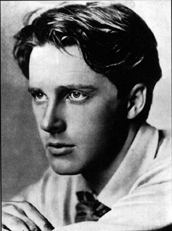Rupert Brooke (1887–1915)
- Biography
- Analysis of 'III. The Dead'
- More Poems by Brooke
- Brooke's Obituary
Biography
For one whom Yeats proclaimed "the handsomest young man in England," Rupert Brooke has not aged well. The neo-Romanticism of Brooke and the Georgian Poets was one of the casualties of The Great War. Paul Fussell (in The Great War and Modern Memory) sees irony as one of the by-products of the First World War, and one of the many ironies of the war is that Rupert Brooke is remembered as a war poet at all, because he is actually not a war poet -- not in the same sense that Siegfried Sassoon, Robert Graves and Wilfred Owen are war poets. Rupert Brooke is rather a pre-war poet. To borrow Blake's contrast, Brooke wrote Songs of Innocence (if not naïveté), while Sassoon and Owen (and others) wrote Songs of Experience.
Brooke's entire reputation as a war poet rests on only 5 "war sonnets" (6 if you count "Treasure" — unnumbered in his short sonnet cycle). Brooke's war experience consisted of one day of limited military action with the Hood Battalion during the evacuation of Antwerp. Consequently, his "war sonnets" swell with sentiments of the most general kind on the themes of maturity, purpose and romantic death -- the kind of sentiments held by many (but not all) young Englishmen at the outbreak of the war. Brooke's "war sonnets" are really more a declaration occasioned by the ups and downs of his tumultuous personal life than a call to war for his generation.
Brooke was already a promising young poet when Britain entered the war the day after his 27th birthday. Unfortunately, the publication of his (pre-) "war sonnets" coincided with his almost mythological (pre-war) death: on Easter Sunday, 1915, Dean Inge read his sonnet "The Soldier" from the pulpit of Saint Paul's; on April 23rd (St. George's Day, the traditional observance of Shakespeare's birth) Brooke died in the Aegean Sea (from blood poisoning) on his way to battle at Gallipoli and was buried on the Island of Skyros. Winston Churchill wrote his obituary for The Times, Lascelles Abercrombie for the Morning Post. As D.H. Lawrence exclaimed: "he was slain by bright Pheobus' shaft . . . it was a real climax of his pose . . . bright Pheobus smote him down. It is all in the saga. O God, O God; it is all too much of a piece: it is like madness."
Brooke was born in 1887 at Rugby where his father was a housemaster. His dominating mother exerted a tremendous influence on him. Brooke traveled in Europe where he prepared a thesis, John Webster and the Elizabethan Drama, which won for him a fellowship at King's College, Cambridge. He roamed across North America and the South Seas for the Westminster Gazette sending back narratives and poems. Brooke was an energetic aesthete skilled at playful, irreverent satire ("Heaven") and not afraid to shock his audience with graphic descriptions ("Channel Crossing").
Biography by: Robert Means
English Literature LibrarianHarold B. Lee Library
Brigham Young University
III. The Dead
Blow out, you bugles, over the rich Dead!
There's none of these so lonely and poor of old,
But, dying, has made us rarer gifts than gold
These laid the world away; poured out the red
Sweet wine of youth; gave up the years to be
Of work and joy, and that unhoped serene,
That men call age; and those who would have been,
Their sons, they gave, their immortality.Blow, bugles, blow! They brought us, for our dearth,
Holiness, lacked so long, and Love, and Pain.
Honour has come back, as a king, to earth,
And paid his subjects with a royal wage;
And Nobleness walks in our ways again;
And we have come into our heritage.
RB, p. 146
Literary Criticism of 'III. The Dead'
-
'The Dead' (Title)
Winston Churchill wrote a moving obituary on Brooke in The Times, 26 April 1915. -
'Blow out, you bugles' (L.1)
The military emphasis is clear from the beginning, and repeated at the beginning of the second stanza. -
'rich Dead' (L.1)
Money, wealth, and particularly reward are interspersed throughout the poem. The dead are rich not only because of their death, but also in the manner in which they have been allowed to die (L.3 'Dying, has made us rarer gifts than gold'). The personified characters of Holiness, Love, Pain, Honour, and Nobleness rule the earth bestowing the wealth upon their subjects like a medieval lord. -
'These laid the world away' (L.4)
Implying that death is a release from the weariness of the world. -
'gave up the years...their immortality' (Ll.5-8)
Brooke is often criticised for his over- romantic view of the War but here he cleverly interjects the idea that death is not without loss. Not only for the soldiers themselves who have lost their future, but also for their offspring 'who would have been' (L.7) cutting off the immortal line of subsequent generations. -
'to earth' (L.11)
Ironically, the resting place of the dead who have paid such a heavy price for the return of Honour. -
'heritage' (L.14)
A curious term to use, but linking clearly with the overall theme of 'payment and reward'. The word implies 'that which is rightfully theirs', almost as if a legal will has been successfully implemented.
LitCrit Notes by: Dr. Stuart Lee



